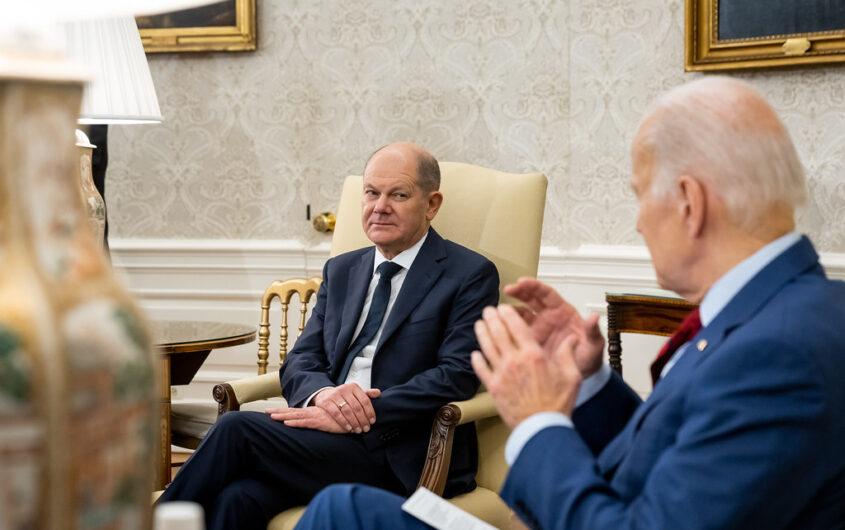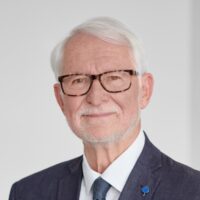
The White House via Flickr
Germany’s Role in the World

James D. Bindenagel
University of Bonn
James D. Bindenagel is a retired U.S. Ambassador, Henry-Kissinger-Professor (Emeritus) at Bonn University, and Senior Non-Resident Transatlantic Fellow at the German Marshall Fund of the United States. He has published: Germany: From Peace to Power? Can Germany Lead in Europe without Dominating it? (2020) and International Sicherheit im 21. Jahrhundert, Deutschlands Verantwortung (2015), both published by V&R Bonn for Bonn University.

Ruediger Lentz
Rud Pedersen
Ruediger Lentz is a journalist, former military correspondent for Der Spiegel and long-time director of the German-American Aspen Institute in Berlin. He now works as Senior Advisor at the Nordic public affairs group Rud Pedersen.
This article was originally published in German in CIVIS, August 2023.
The question of Germany’s role in the world is as old as the Federal Republic. In the beginning, it was easy to answer: first an occupation zone, then a more or less sovereign entity at the mercy of the Allied Western Powers, and only from 1955—virtually coinciding with its entry into NATO—a fully sovereign country, firmly integrated into the Western defense alliance. Germany’s role began with the Federal Republic’s unequivocal commitment to the West, which practically went hand in hand with rearmament. It was forced under Konrad Adenauer, initially fiercely opposed by the Social Democratic opposition party, and only accepted by the SPD with the Godesberg Program. In the years that followed, it was recognized across all parties as the foundation of German foreign and security policy and has been the continuum of political action by the established parties in the Federal Republic ever since.
It was not until the beginning of the social-liberal coalition in 1969 and after the Harmel Report of 1967 that Germany initiated the so-called policy of détente, the Detenté, which suddenly catapulted Germany into an active role vis-à-vis Eastern Europe. This time, the SPD under Chancellor Willy Brandt and the Free Democrats drove the détente strategy toward Moscow and Eastern Europe.
The German strategy of limited cooperation with the East was closely coordinated with allies in NATO, especially the United States. It was based on a policy of military strength and the system of mutual recognition of military deterrence principles between the Warsaw Pact and NATO.
The foreign policy equation at that time was straightforward: defense + détente = security! This hypothesis also underlay the successes of the Conference on Security and Cooperation in Europe (CSCE), which for the first time bindingly defined the basic principles of peaceful coexistence between East and West across ideological boundaries. The CSCE process was one of the decisive factors in the development leading up to the fall of the Berlin Wall in 1989, the dissolution of the Warsaw Pact, and the collapse of the Soviet Union.
And what came next: the dream of the “end of history” and a democratic, Western-oriented world from Vladivostok to Vancouver has long since faded. While the United States still dominated foreign policy unchallenged in the 1990s, the new century quickly evolved into a multi-polar mixed bag of threats, characterized by America’s waning influence and commitment, a rapid economic and military rise of China, and a revisionist and aggressive foreign policy of Russia.
While the National Security Strategy takes a clear position on Russia and the China Strategy at least re-nuances Germany’s stance toward Beijing, the transatlantic relationship must be readjusted.
The erratic foreign policy of the United States under Donald Trump has exacerbated the explosive nature of this foreign policy environment. Under the circumstances of this global complexity, it was and is difficult for German foreign and security policy to position itself clearly and convincingly define the interests and goals of its nation.
Cynical as it may sound, Russia’s invasion of Ukraine forced us and the entire West to rethink our security arrangements, rethink foreign policy, and redefine the resilience of our security.
And this is not just about the 2% goal of sufficient military defense and deterrence, but much more:
- The future of transatlantic relations,
- The role and viability of NATO, and
- The question of the cohesion and political viability of the European Union.
The traffic light coalition has tried to consider this through its concept of a new National Security Strategy for Germany. But do the goals and intentions set out in it provide sufficient and convincing answers to current and future foreign and security policy challenges?
Germany’s first National Security Strategy, published on June 14, 2023, is a step in the right direction toward redefining Germany’s role, even if, in many places, it merely repeats the familiar.
On the positive side, it defines German interests more comprehensively and expands them to include the concept of integrated security. However, it fails to set priorities and strategies for addressing security challenges. In particular, the task now must be to formulate alternatives to Germany’s strategic dependence:
- dependence on cheap Russian fossil fuels,
- dependence on exports to and imports from China, and
- dependence on U.S. security guarantees for Europe.
Of these three issues, consideration of alternatives to Russian energy is the most advanced, and the China Strategy of July 13, 2023, has at least begun to clarify the relationship with China and East Asia. However, the German government has yet to provide any new impetus beyond the familiar and proven statements on the future of transatlantic relations.
Russia and the Eastern European region
The German National Security Strategy clearly states that today’s Russia “poses the greatest threat to peace and security in the Euro-Atlantic area for the foreseeable future.” This threat will remain if Russia is ruled by an autocratic regime with imperialist great power ambitions that does not care about international law principles and challenges its neighbors’ territorial integrity.
Many wonder how the war against Ukraine can end and whether a politically sustainable peace is possible. However, the call for negotiations is premature and dangerous for peace in Europe. It only leads to a frozen conflict in Europe, not peace. Some U.S. strategists and diplomats are making the same mistakes they made in the 2000s during the “frozen conflicts” in the South Caucasus and in 2014 when Russia invaded Crimea and the Donbas. They advocate a ceasefire without considering the long-term implications for peace and security in the region and the foreseeable devastating effects on NATO and EU cohesion. Germany’s responsibility must, therefore, be to advocate aggressively the early NATO accession for Ukraine. It is the only guarantor to stop Putin’s neo-imperialist expansionist policy in the long term.
Relationship with China
Germany’s recently published China strategy specifies what it means for China to be a “partner, competitor, and systemic rival.” It also acknowledges that the “elements of rivalry and competition” have increased in recent years due to China’s behavior. So far, so good!
China, unlike Russia, which is trying to prevent its decline as a world power by all autocratic and military means, is an emerging world power. The Middle Kingdom is still Germany’s and the EU’s largest trading partner, so decoupling the German and European economies from China would have devastating consequences for the German economy. The China strategy sets out to some extent what “de-risking” means. However, it does not set out clear “red lines” for German companies forced to continue operating at their own risk without clear policy guidelines.
Transatlantic relations and the EU
While the National Security Strategy takes a clear position on Russia and the China Strategy at least re-nuances Germany’s stance toward Beijing, the transatlantic relationship must be readjusted. Instead, the National Security Strategy repeats familiar positions of simultaneous engagement with NATO and the EU. But here, too, the turn of the times must have consequences for Germany’s role. The domestic political polarization in the United States is not over. In the coming years, it will continue to have a massive impact on the future role of the United States as a world power. And this will be the case regardless of who wins the 2024 U.S. presidential election.
The days when Europe and Germany could base their security on U.S. strategic engagement in Europe are irrevocably over. Therefore, it is time for Germany to lead in recalibrating European transatlantic relations.
This plan includes, among other things:
- the massive expansion of the European pillar in NATO,
- the assumption of military burdens by Europe and Germany in the Indo-Pacific as well,
- supporting the Central, Northern, and Eastern European member states of NATO and the EU in building resilient defense structures, and
- the establishment and expansion of an effective European defense industry.
Europeans must reform the defense industry without delay. Competing national weapons systems and fragmentation of production undermine European security. With so many weapons and ammunition stockpiles depleted for Ukraine’s defense, Europeans have a unique opportunity to consolidate European weapons and munitions procurement standards.
Germany has a unique role to play in bringing its interests and values to bear in such a way that the rules-based world order can survive.
If Germany uses it correctly, Scholz’s 100-billion-euro special fund for the Bundeswehr could help advance the standardization of weapons and ammunition among NATO’s European partners.
The EU Commission’s initiative to strengthen the European defense industry through joint procurement (EDIRPA) is a welcome development in this context. EDIRPA creates a standard instrument for defense procurement that will help close the most urgent and critical gaps in the EU’s defense capabilities.
Turning the Tide
If the turning of the tide—Zeitenwende—is to be a success, Germany must take a more active and responsible role as a European leader without exercising dominance. Emmanuel Macron encourages Germany to become more active globally at every opportunity. Radek Sikorski, Poland’s former foreign minister, rightly posited back in 2011: “I fear Germany’s power less than I begin to fear its inactio
The surprisingly great cohesion of the European Union and NATO triggered by the Ukraine war is by no means a guarantee that this will continue. That is why Germany—especially together with France, Poland, and the United Kingdom—has a unique role to play in bringing its interests and values to bear with those of its European partners as well as its American and Asian allies in such a way that the rules-based world order can survive.
If the Zeitenwende fails, future generations will quote the English historian A.J.P. Taylor, who said of the 1848 Revolution, “German history reached its turning point and failed to turn.” Not acting now or acting too late are not options for Germany.









